
CRM vs. Spreadsheets: Why It's Time to Upgrade Your Sales Process
For years, businesses have relied on spreadsheets to manage their sales processes. While spreadsheets offer a simple way to store and track data, they lack the advanced features needed to scale efficiently. If your business is still using spreadsheets to track leads, follow up with customers, and manage sales pipelines, it might be time for an upgrade.
A Customer Relationship Management (CRM) system offers automation, better collaboration, and advanced analytics—helping businesses boost productivity and revenue. In this blog, we'll compare CRM vs. spreadsheets and highlight why it's time to upgrade your sales process.
1. Data Management: Organized vs. Overwhelming
Spreadsheets: Managing customer data in spreadsheets can quickly become chaotic. As your business grows, multiple files, duplicate entries, and outdated information make it difficult to maintain accuracy.
CRM: A CRM centralizes all customer data in one place. It automatically updates records, eliminates duplicates, and makes it easier to access real-time information without searching through endless rows and columns.
2. Automation: Manual Work vs. Smart Processes
Spreadsheets: Sales teams using spreadsheets often spend hours manually updating records, sending follow-ups, and tracking progress.
CRM: A CRM automates repetitive tasks such as sending follow-up SMS, setting reminders, and assigning leads. This saves time and allows your team to focus on closing deals instead of data entry.
3. Collaboration: Isolated Work vs. Team Connectivity
Spreadsheets: When multiple team members work on the same spreadsheet, version control issues arise. Important updates can be lost, and miscommunication is common.
CRM: CRMs enable seamless collaboration by allowing multiple users to access, update, and track customer interactions in real time. This ensures everyone on the team stays on the same page.
4. Analytics & Reporting: Limited Insights vs. Data-Driven Decisions
Spreadsheets: Generating reports from spreadsheets requires extensive manual work and knowledge of complex formulas. Analyzing trends can be time-consuming and prone to errors.
CRM: A CRM provides built-in analytics and reporting tools that offer deep insights into sales performance, customer behavior, and revenue forecasts. Businesses can make data-driven decisions faster and more accurately.
5. Scalability: Growth Challenges vs. Seamless Expansion
Spreadsheets: As your business grows, spreadsheets become difficult to manage. More data leads to slower performance, increased errors, and limited functionality.
CRM: CRMs are designed to scale with your business. Whether you're adding new team members, handling more customers, or integrating with other tools, a CRM can handle the growth without performance issues.
6. Security: Risky Storage vs. Safe & Compliant
Spreadsheets: Customer data stored in spreadsheets is vulnerable to accidental deletions, unauthorized access, and security breaches.
CRM: A CRM provides secure cloud-based storage, role-based access control, and compliance with data protection laws, ensuring your business and customer data remain safe.
Conclusion: It's Time to Upgrade
While spreadsheets may work for startups or small businesses in the early stages, they are not built for long-term sales success. A CRM enhances productivity, improves customer relationships, and drives business growth through automation, analytics, and security.
If you're ready to take your sales process to the next level, it's time to switch to a CRM. Your business—and your sales team—will thank you for it!
Are you still using spreadsheets? Explore MassAxis CRM and experience the difference today!
Recent Post
Tags
Recent blog
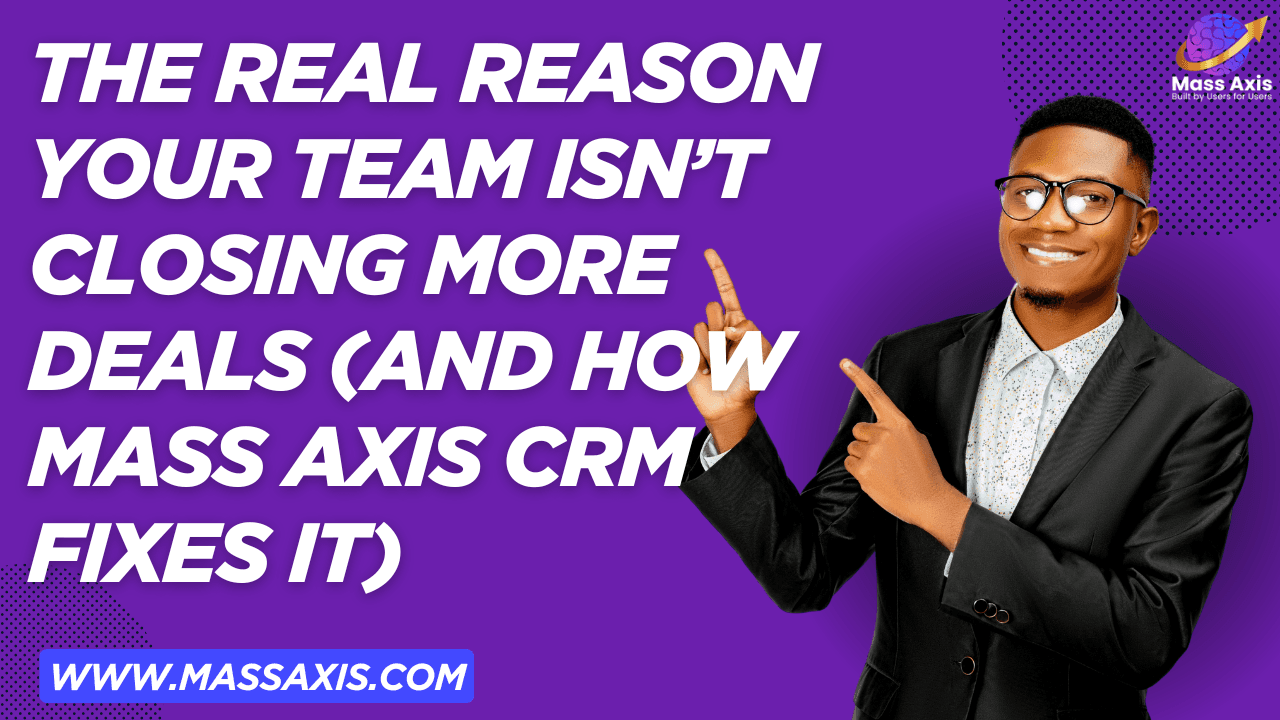
<h1><strong>The Real Reason Your Team Isn’t Closing More Deals (And How Mass Axis CRM Fixes It)</strong></h1><p><em>By J...
Read Story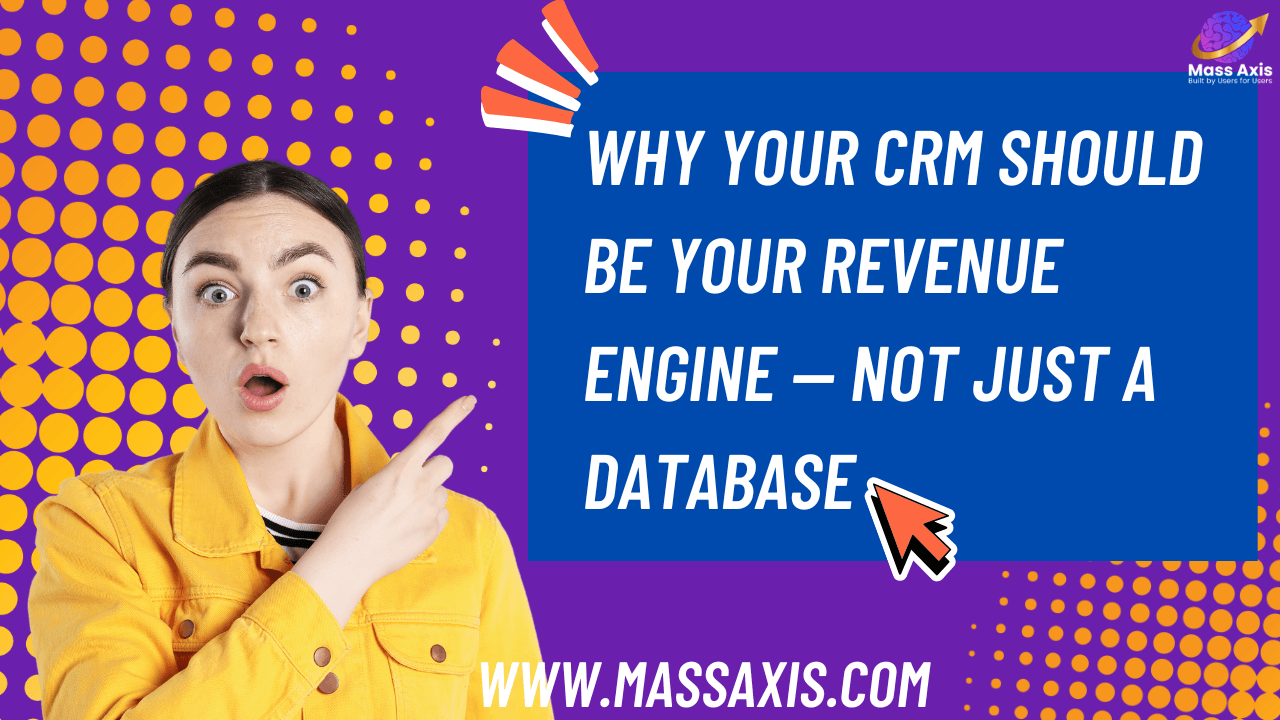
<h1><strong>Why Your CRM Should Be Your Revenue Engine - Not Just a Database</strong></h1><p><em>By Jordan Hale, Senior ...
Read Story
<h1><strong>Why Speed Is the #1 Competitive Advantage in Real Estate (And How Mass Axis CRM Gives It to You)</strong></h...
Read Story
<h1><strong>Why Real Estate Wholesalers Need a CRM Built for Outreach - Not Admin Work</strong></h1><p><em>By Jordan Hal...
Read Story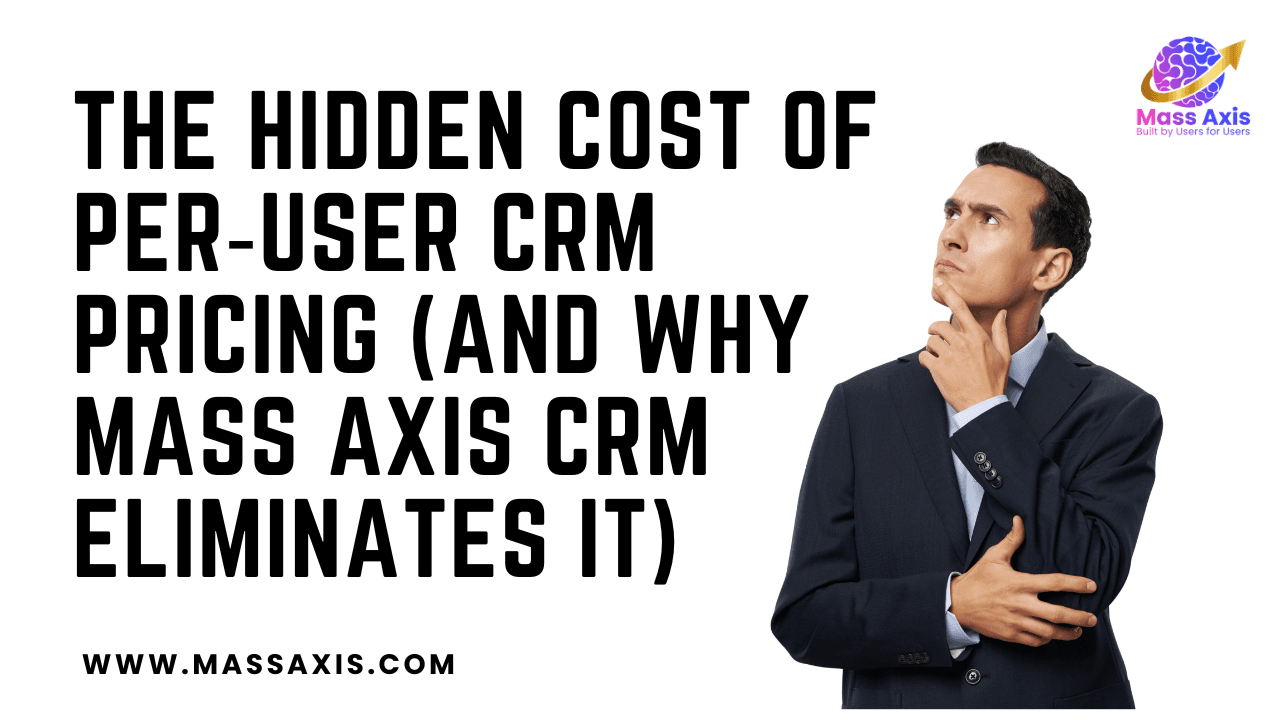
<h1><strong>The Hidden Cost of Per‑User CRM Pricing (And Why Mass Axis CRM Eliminates It)</strong></h1><p><em>By Jordan ...
Read Story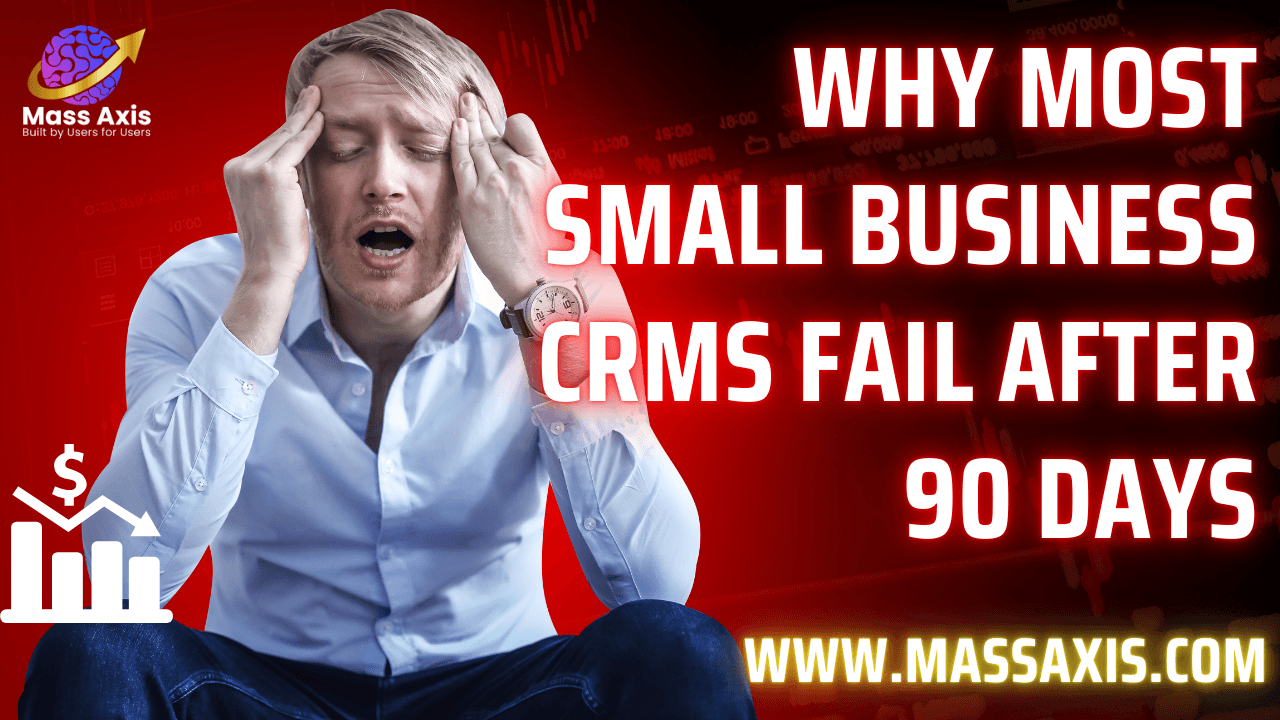
<h1><strong>Why Most Small Business CRMs Fail After 90 Days</strong></h1><p><em>By Jordan Hale, Senior Content Strategis...
Read Story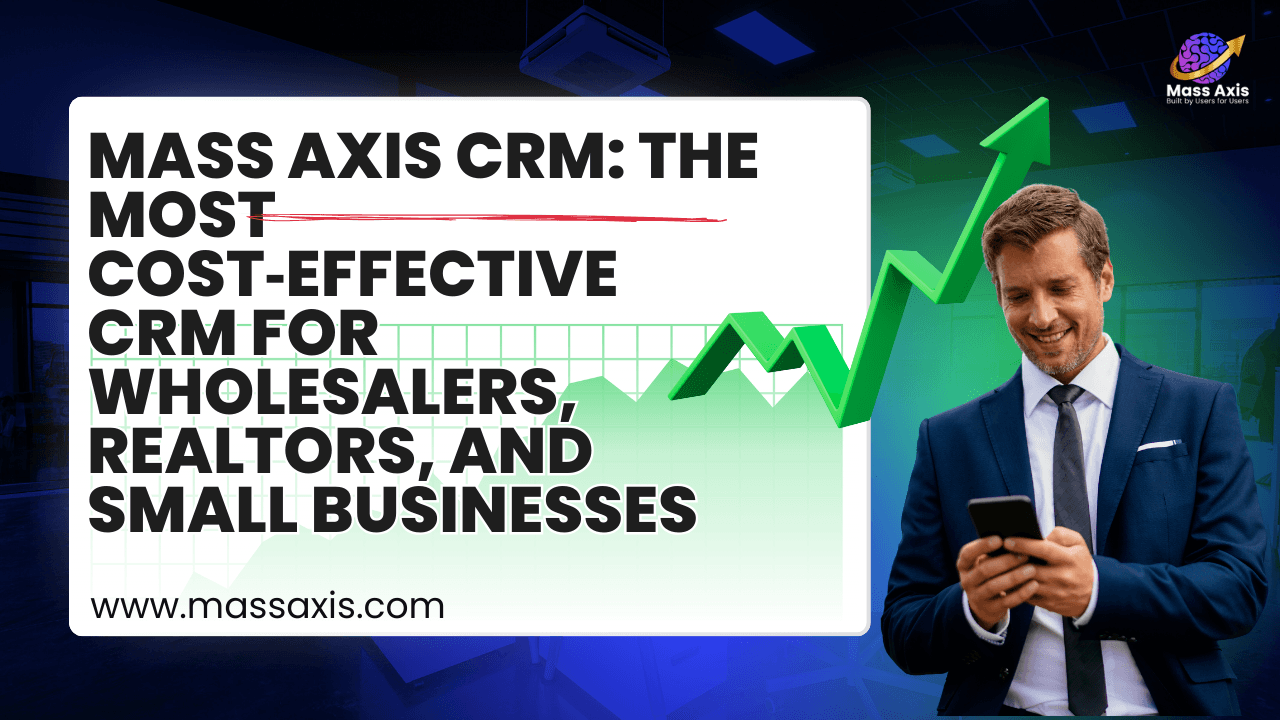
<h1><strong>Mass Axis CRM: The Most Cost‑Effective CRM for Wholesalers, Realtors, and Small Businesses</strong></h1><p><...
Read Story
<h1><strong>How Mass Axis CRM Helps Real Estate Teams Close More Deals With Less Stress</strong></h1><p><em>By Jordan Ha...
Read Story
<h1><strong>How Much Money Mass Axis CRM Actually Saves You Compared to Other CRMs</strong></h1><p><em>By Jordan Hale, S...
Read Story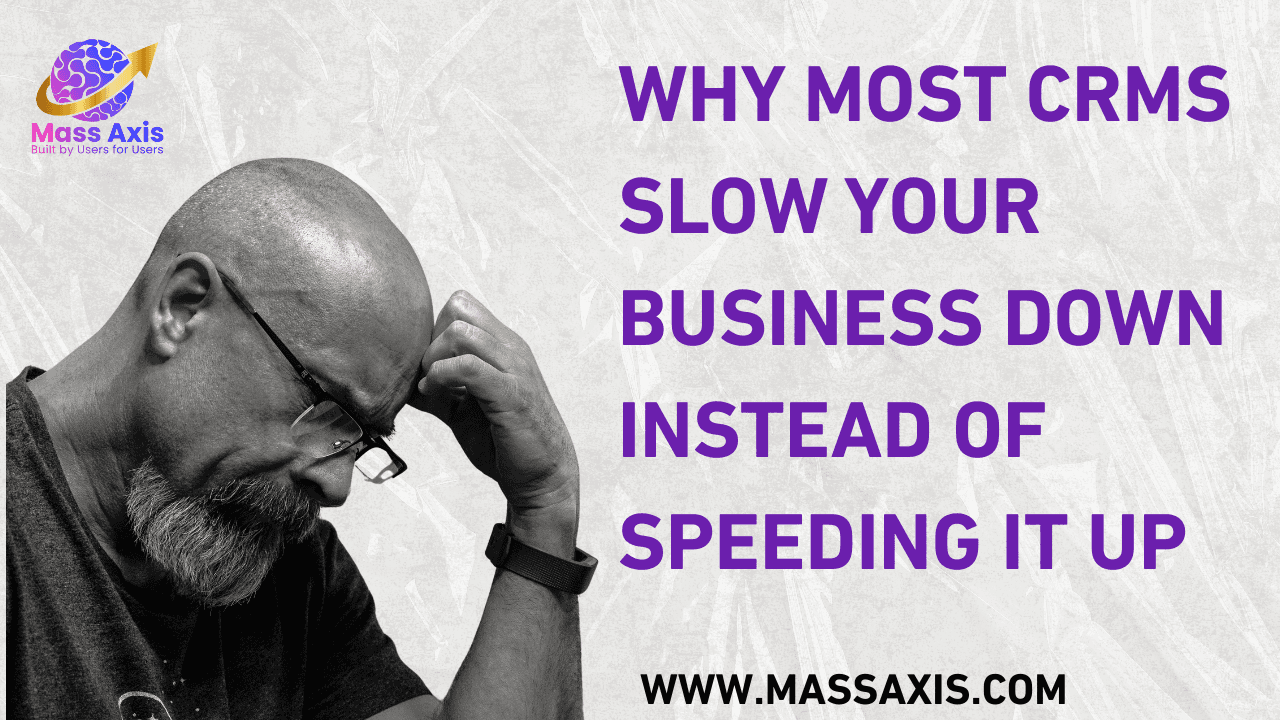
<h1><strong>Why Most CRMs Slow Your Business Down Instead of Speeding It Up</strong></h1><p><em>By Jordan Hale, Senior C...
Read Story
<h1><strong>Why Mass Axis CRM Is the Best CRM for Teams That Use VAs and Cold Callers</strong></h1><p><em>By Jordan Hale...
Read Story
<h1><strong>Why Mass Axis CRM Is the Best CRM for Real Estate Wholesalers</strong></h1><p><em>By Jordan Hale, Senior Con...
Read Story
<h1><strong>Mass Axis CRM vs Podio: Which One Is Better for Real Estate Wholesalers and Small Business Teams?</strong></...
Read Story
<h1><strong>Mass Axis CRM vs REsimpli: Which CRM Gives Wholesalers and Small Business Teams More Value?</strong></h1><p>...
Read Story
<p><em>By Jordan Hale, Senior Content Strategist at Mass Axis CRM</em></p><p><br /></p><p>Real estate investors operate ...
Read Story
<h3>By: <em>Jordan Hale, Senior Content</em></h3><p><br /></p><h3><strong>The Spreadsheet Struggle Is Real</strong></h3>...
Read Story
<p><strong>By: Marcus Reid - Sales Technology Specialist</strong></p><h3> </h3><h3>The Spreadsheet Struggle Is Real</h3>...
Read Story
<p><em>By Jordan Hale, Senior Content Strategist at Mass Axis CRM</em></p><p> </p><p>The real estate market has changed ...
Read Story
<p><em>By Jordan Hale, Senior Content Strategist at Mass Axis CRM</em></p><p><br /></p><p>If there’s one thing that sile...
Read Story
<h1><strong>The Best CRM for Real Estate Wholesalers in 2026</strong></h1><p><em>By Jordan Hale, Senior Content Strategi...
Read Story
<h1><strong>How to Run Your Entire Wholesaling Business Inside Mass Axis CRM</strong></h1><p><em>By Jordan Hale, Senior ...
Read Story
<h1><strong>How Realtors Can Manage Listings and Buyers in One System Using Mass Axis CRM</strong></h1><p><em>By Jordan ...
Read Story
<h1><strong>How Mass Axis CRM Saves You $10,000 Per Year</strong></h1><p><em>By Jordan Hale, Senior Content Strategist a...
Read Story
<h1><strong>How to Train Your VA to Use Mass Axis CRM in 24 Hours</strong></h1><p><em>By Jordan Hale, Senior Content Str...
Read Story
<h1><strong>Why Your CRM Is Slowing You Down (And How Mass Axis CRM Fixes It)</strong></h1><p><em>By Jordan Hale, Senior...
Read Story
<h1><strong>The Best CRM for Small Business Teams in 2026</strong></h1><p><em>By Jordan Hale, Senior Content Strategist ...
Read Story
<h1><strong>The Ultimate Guide to Real Estate Lead Management in 2026</strong></h1><p><em>By Jordan Hale, Senior Content...
Read Story
<p><em>By Jordan Hale, Senior Content Strategist at Mass Axis CRM</em></p><p><br /></p><p>Deal flow is the lifeblood of ...
Read Story
<p><em>By Jordan Hale, Senior Content Strategist at Mass Axis CRM</em></p><p>Real estate wholesaling in 2026 is more com...
Read Story
<p><em>By Jordan Hale, Senior Content Strategist at Mass Axis CRM</em></p><p>Real estate wholesaling rewards speed, cons...
Read Story
<p>CRMs are undergoing a quiet revolution. They’re evolving from static databases into active workspaces where sales act...
Read Story
<p>January feels like a fresh start—but it’s also the month when many teams quietly lock themselves into another year of...
Read Story
<p>On paper, many CRMs look similar: pipelines, contacts, reporting. The real differences only show up when you ask two ...
Read Story
<p>A modern CRM should do more than store contacts and stages. It should help you move deals forward every single day. T...
Read Story
<p>Some integrations are “nice to have.” Others fundamentally change how much pipeline you can create and manage. When y...
Read Story
<p>There’s a new, unspoken standard for CRMs: if your reps can’t run their entire day from it, it’s already outdated. Mo...
Read Story
<p>Picture this: your team spends a full workweek every month on pure admin—creating reminders, updating stages, logging...
Read Story
<p>Legacy CRMs were built for a world where deals moved slowly, teams sat at desks all day, and IT controlled everything...
Read Story
<p>In 2026, the real CRM trend isn’t “more features”—it’s consolidation. The best teams are ditching their patchwork of ...
Read Story
<p>AI is transforming CRM from passive storage into an active partner in your sales process. But here’s the catch: AI is...
Read Story
<p>Most CRM conversations focus on subscription price—but the real cost lurks elsewhere. How many other tools do you pay...
Read Story
<p>Bad data doesn’t start out bad; it becomes bad when reps stop updating the CRM. Maybe it’s too slow, too confusing, o...
Read Story
<p>Ask a room of sales directors about their CRM and you’ll hear the same confession: “We bought for features, not for a...
Read Story
<p>If you look at the teams breaking records in 2026, they all share one thing: fewer manual steps between “I should do ...
Read Story
<p>Watch your top reps closely and you’ll notice something: they ignore half the CRM. They’re not spending time in compl...
Read Story
<p>For many small business owners, “CRM” sounds like something built for big corporate teams. So they piece together cal...
Read Story
<p>Imagine running a lean operation stuck at $500K a year—not because demand isn’t there, but because follow‑up is incon...
Read Story
<p>Think about how much time your team spends on “meta work”: hunting for notes, copying data between tools, rebuilding ...
Read Story
<p>Most CRM implementations don’t fail because the software is “bad.” They fail because the rollout is overcomplicated, ...
Read Story
<p><em>Most teams treat their CRM like a filing cabinet: a place to dump contact info and update stages once in a while....
Read Story
<p><em>Even the biggest companies are walking away from legacy CRMs—not because they hate data, but because they’re tire...
Read Story
<p><em>Spreadsheets feel “good enough” when you’re small—but as your pipeline grows, Excel quietly turns into a revenue ...
Read Story
<p><em>There is a silent productivity killer in most sales teams: manual updating. Every day, reps burn 15–30 minutes lo...
Read Story
<p><em>Sales reps rarely quit over “one bad month.” They quit over tools that make winning harder than it should be. Whe...
Read Story
<p><em>Every sales leader dreams of a big jump in close rates, but many chase the wrong levers first—new scripts, new tr...
Read Story
<p>Sometimes the biggest jump in performance does not come from a new pitch or discount—it comes from giving your team a...
Read Story
<p>Elite sales teams are not just working harder; they are working with sharper focus and better visibility. They always...
Read Story
<p>Some CRM features sound impressive on a sales sheet but drag performance in real life: bloated on-prem setups, overco...
Read Story
<p>It is easy to blame quota misses on lead quality, pricing, or the broader market. In reality, many teams fall short b...
Read Story
<p>Top sales teams are done tolerating bloated, confusing CRMs that reps secretly hate logging into. If the CRM feels li...
Read Story
<p>Most teams are not losing money because of bad leads—they are losing it because leads quietly fall through the cracks...
Read Story
<p>If you're a solopreneur or small business owner, you already wear a dozen hats—prospecting, client follow-ups, market...
Read Story
<h3>One CRM. Two Powerful Channels.</h3><p>In sales, <strong>speed and timing</strong> win deals. With Mass Axis, your C...
Read Story
<h3><br /></h3><h3>? Stay Consistent. Stay Competitive.</h3><p>Leads go cold when you don’t follow up—and most sales tea...
Read Story
<h3>Know Who’s Who—and What To Do Next</h3><p>Your CRM shouldn’t just hold contact names—it should help you prioritize, ...
Read Story
<p><br /></p><p>Why Mass Axis Becomes a Daily Sales Habit</p><p>Let’s be real—most CRMs are glorified spreadsheets packe...
Read Story
<p><strong>? SMS + Power Dialer = Revenue: Inside the Mass Axis Sales Formula</strong></p><p>In the fast-paced world of ...
Read Story
<p><strong>? How to Automate Follow-Ups and Close More Deals with Mass Axis CRM</strong></p><p>In today’s sales environm...
Read Story
<p><strong>? MassAxis CRM for Sales Teams in 2025: The Ultimate Growth Engine</strong></p><p>In 2025, speed, personaliza...
Read Story
<p><strong>? Choosing Mass Axis CRM: Match Your Needs in Minutes</strong></p><p>When it comes to choosing a CRM, the opt...
Read Story
<p><strong>⚡ Why Mass Axis CRM Fits Your Business in Minutes</strong></p><p>Choosing the right CRM shouldn’t feel like a...
Read Story
<p><strong>? Consider Budget, Size, Features & Integrations When Choosing Mass Axis CRM</strong></p><p>Choosing the ...
Read Story
<p>Think CRMs make your business feel cold or robotic? Think again.</p><p>When done right, a CRM doesn’t replace the hum...
Read Story
<p> In today's competitive business landscape, effectively managing customer relationships is crucial for growth and sus...
Read Story
<h2>Will a CRM System Impact the Personal Touch I Currently Have with My Customers?</h2><p>As businesses grow, maintaini...
Read Story
<h2>Choosing the right CRM can make or break your business operations. With so many options out there, it’s crucial to p...
Read Story
<h2>Why Simplicity Matters in CRM Software</h2><p>Customer Relationship Management (CRM) platforms are essential for bus...
Read Story
<p>Customer Relationship Management (CRM) platforms are essential for businesses looking to streamline interactions, imp...
Read Story
<p>Running a small business comes with its own set of challenges, from managing customer relationships to keeping track ...
Read Story
<p>Customer Relationship Management (CRM) has evolved from basic contact databases to advanced platforms that drive busi...
Read Story
<p>Customer Relationship Management (CRM) systems like Mass Axis CRM are powerful tools for managing customer interactio...
Read Story
<p>In 2025, small businesses must embrace digital tools to stay competitive, and a <strong>Customer Relationship Managem...
Read Story
<p>Real estate wholesaling is a fast-paced industry where speed, efficiency, and organization are crucial for success. W...
Read Story
<p>In today's fast-paced business world, small businesses face many challenges in managing customer relationships, strea...
Read Story
<p>In the fast-paced world of sales, managing leads effectively can be the difference between a thriving business and lo...
Read Story
<p>Finding the right Customer Relationship Management (CRM) system is crucial for business success. Many businesses turn...
Read Story
<p>In the competitive world of business, customer relationship management (CRM) software plays a crucial role in scaling...
Read Story
<p>For years, businesses have relied on spreadsheets to manage their sales processes. While spreadsheets offer a simple ...
Read Story
<p>In the fast-paced world of sales, managing leads effectively can be the difference between a thriving business and lo...
Read Story
<p>In the fast-paced world of real estate investing, efficiency and organization are key to success. Managing leads, tra...
Read Story
<p>In today’s fast-paced business world, efficiency is key. At MassAxis CRM, we understand the importance of seamless wo...
Read Story
<p>In today’s fast-paced digital landscape, businesses must stay ahead by making informed decisions backed by real-time ...
Read Story
<p>In today’s highly competitive business environment, direct communication remains one of the most effective ways to co...
Read Story
<p>Customer Relationship Management (CRM) is evolving rapidly, driven by technological advancements and changing busines...
Read Story
<p>Every business aims to achieve the highest return on investment (ROI) from its tools and resources. MassAxis CRM, bui...
Read Story
<p>As a small business owner, you might be wondering, "Do I really need a CRM?" After all, you're not managing a massive...
Read Story
<p>Choosing the right <strong>Customer Relationship Management (CRM) software</strong> is crucial for small businesses l...
Read Story
<h2>Boost Your Wholesaling Business with the Best CRM Software</h2><p>In the fast-paced world of <strong>real estate who...
Read Story
<h2>The Game-Changer for Small Businesses</h2><p>Running a small business comes with its fair share of challenges—limite...
Read Story
<p>Finding the right <strong>CRM software</strong> is crucial for businesses that want to improve <strong>customer relat...
Read Story
<p>In today's competitive market, having the right <strong>CRM software</strong> can make or break your business. Whethe...
Read Story
<p>In today’s digital landscape, businesses rely on various software solutions to streamline operations, enhance custome...
Read Story
<p><em>In today’s fast-paced business world, staying organized, connecting with leads, and managing campaigns can make o...
Read Story